Pouring a concrete slab may be exactly what you need to improve your home, but it can be very expensive. The costs vary depending on a number of factors.
A big part of it is just how big of an area you’re trying to fill. The more square footage, the more it’ll cost. Similarly, slab thickness and the various designs or add-ons like decorative finishes all play a role in the final price tag.
Whether you’re dreaming of a sturdy patio, a spacious garage floor, or even a solid foundation for your future home, you should understand the costs for concrete slabs before you even break ground.
Concrete Slab Costs
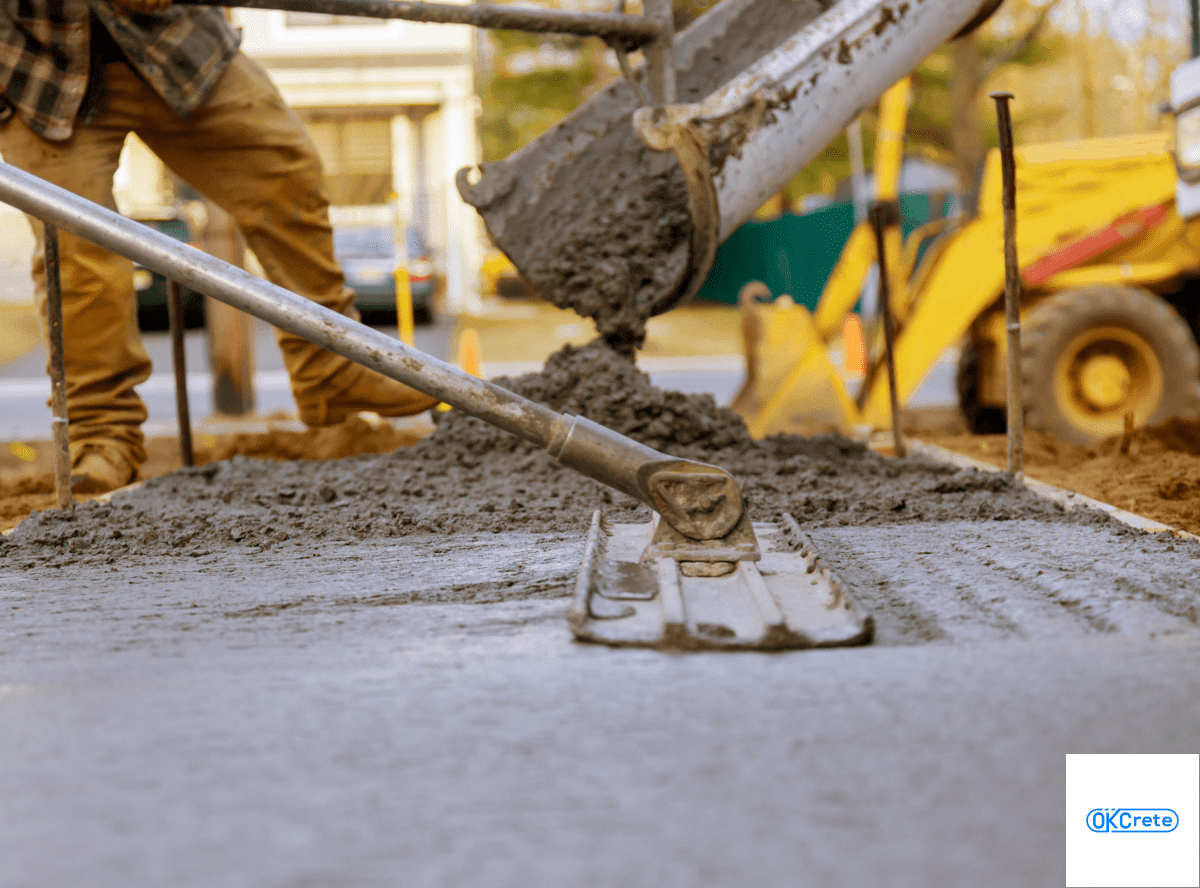
A concrete slab costs $6 to $12 per square foot on average. The costs are lower when we have easy access to the project area. For example, if our equipment has trouble reaching the job site due to a fence or small entry area, we’ll need to utilize a pump truck and Georgia buggies. This will drive up the price.

Cost to Pour Concrete by Project
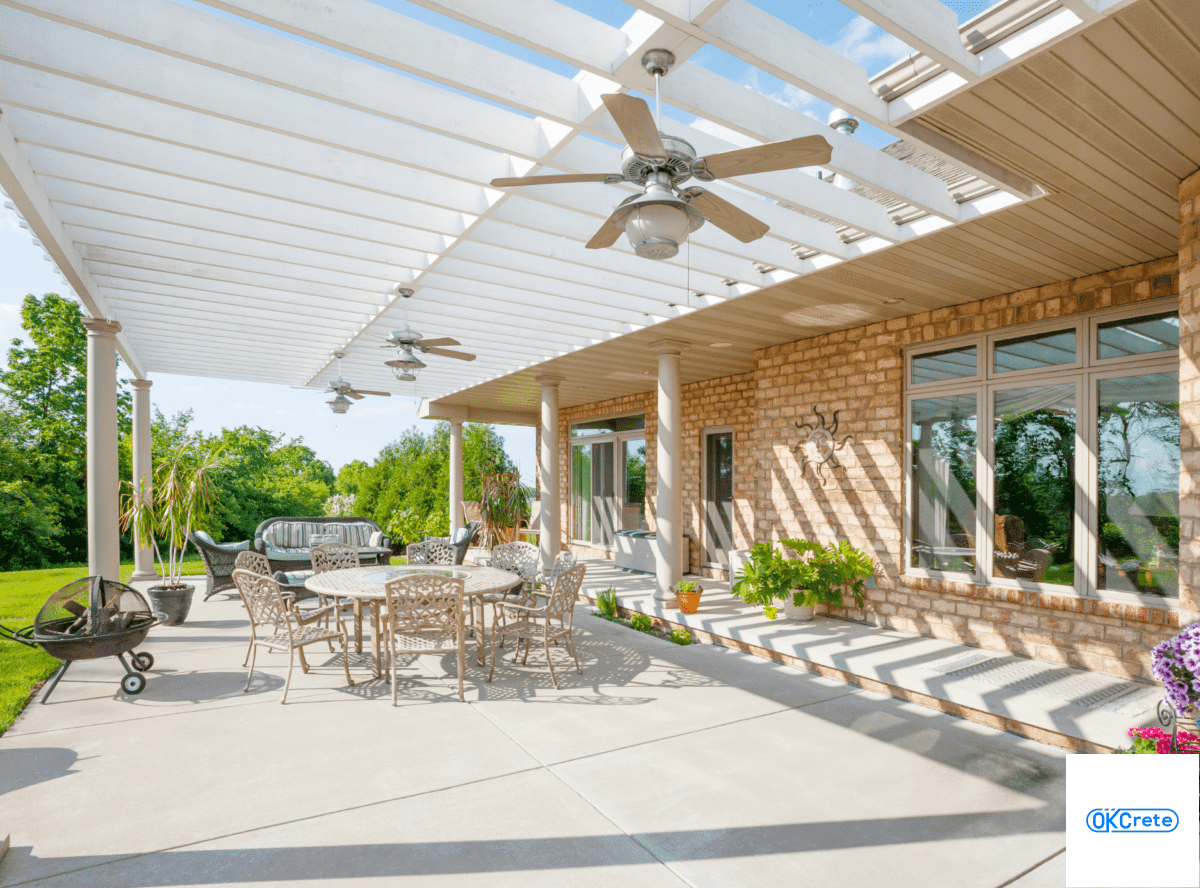
The costs associated with concrete slabs vary based on the project and the square footage involved. For endeavors such as home foundations, thicker slabs or steel reinforcement might be necessary, which might drive up the costs even more. Conversely, more straightforward projects like a simple patio tend to have simpler cost structures.

Concrete Shed Foundations
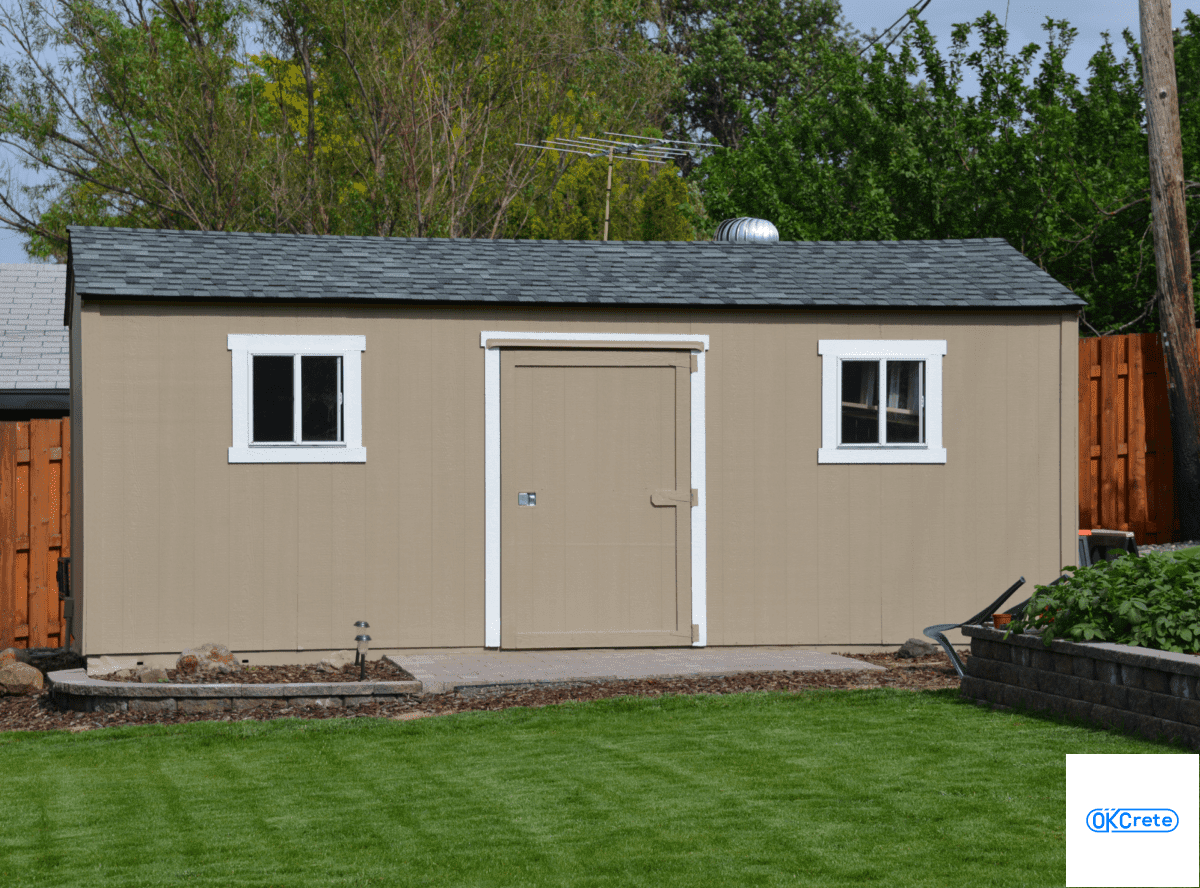
The installation of a full concrete slab foundation or shed foundation ranges from $3,000 to $8,000 for a slab measuring 10’x10′ to 20’x20′. Typically, shed slabs are around 4 inches thick and typically do not necessitate reinforcement or decorative elements.
Concrete Patios
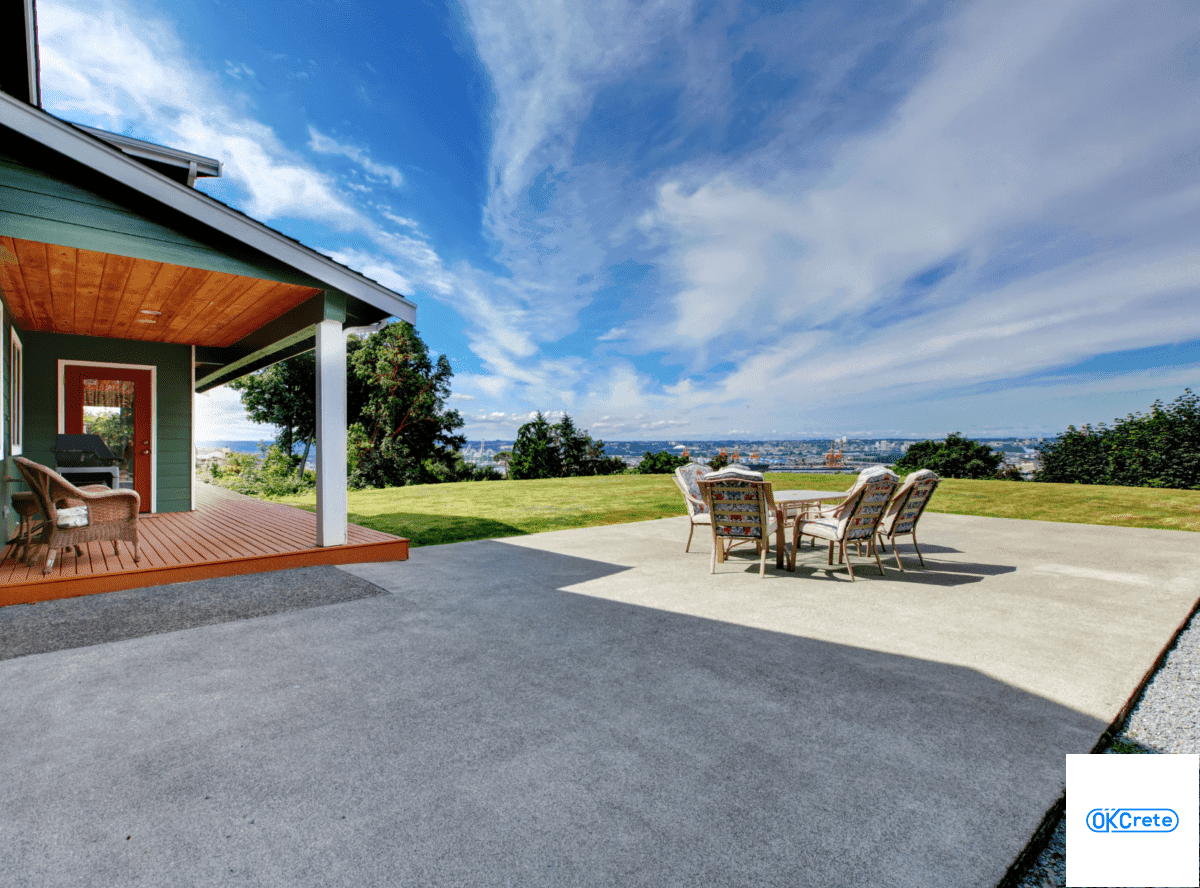
The installation of a concrete patio typically costs around $2,000 to $7,000 for a 10’x20′ to 20’x20′ patio. Many patios use a simple broom finish or basic texture, but prices go up for designs with multiple colors and decorative finishes.
Concrete Garage Floors
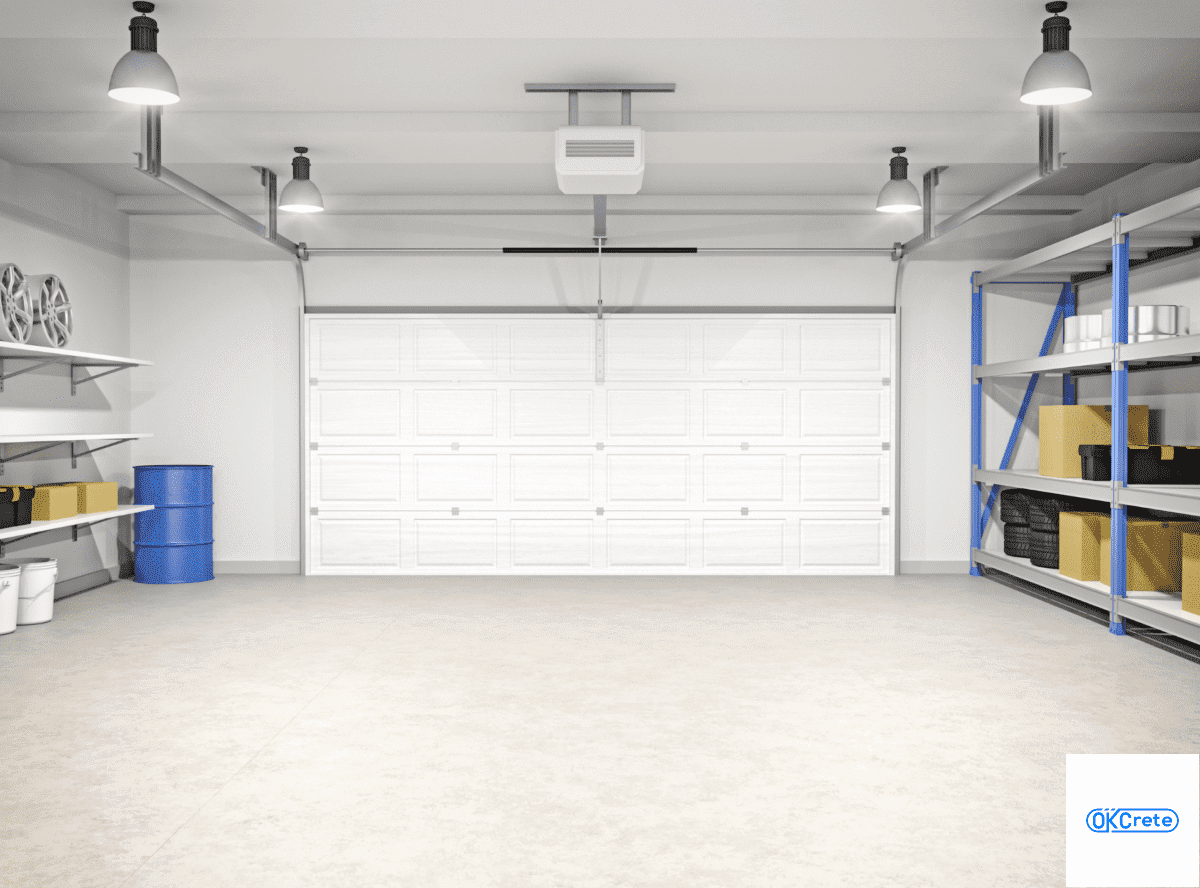
A 2-car garage floor costs $3,000 to $9,000 with installation. Most 2-car garages are 20’x20′ to 24’x24′ and are made with reinforced concrete slabs that are 4″ to 6″ thick. Like patios, garage floors typically have a basic finish.
Certain homeowners choose to enhance their garage floors with paint or other coatings. The cost of epoxy floor coating ranges from $4 to $10 per square foot, varying based on the type, design, and the number of layers applied.
Concrete Driveways
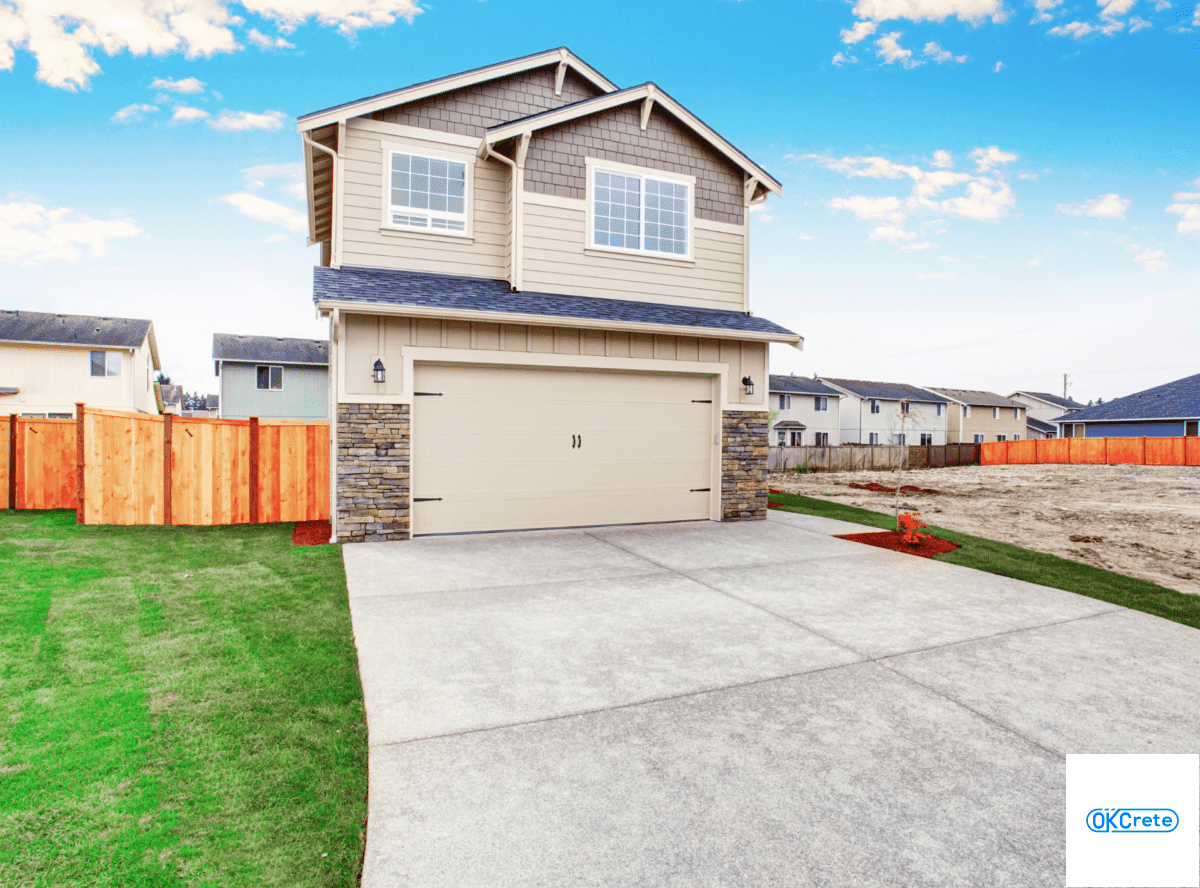
A concrete driveway costs $6 to $12 per square foot with installation, or $6,400 to $9,600 total on average. Some concrete driveways have decorative colors, borders, stamped patterns, or finishes — which changes the price.
Concrete Foundations
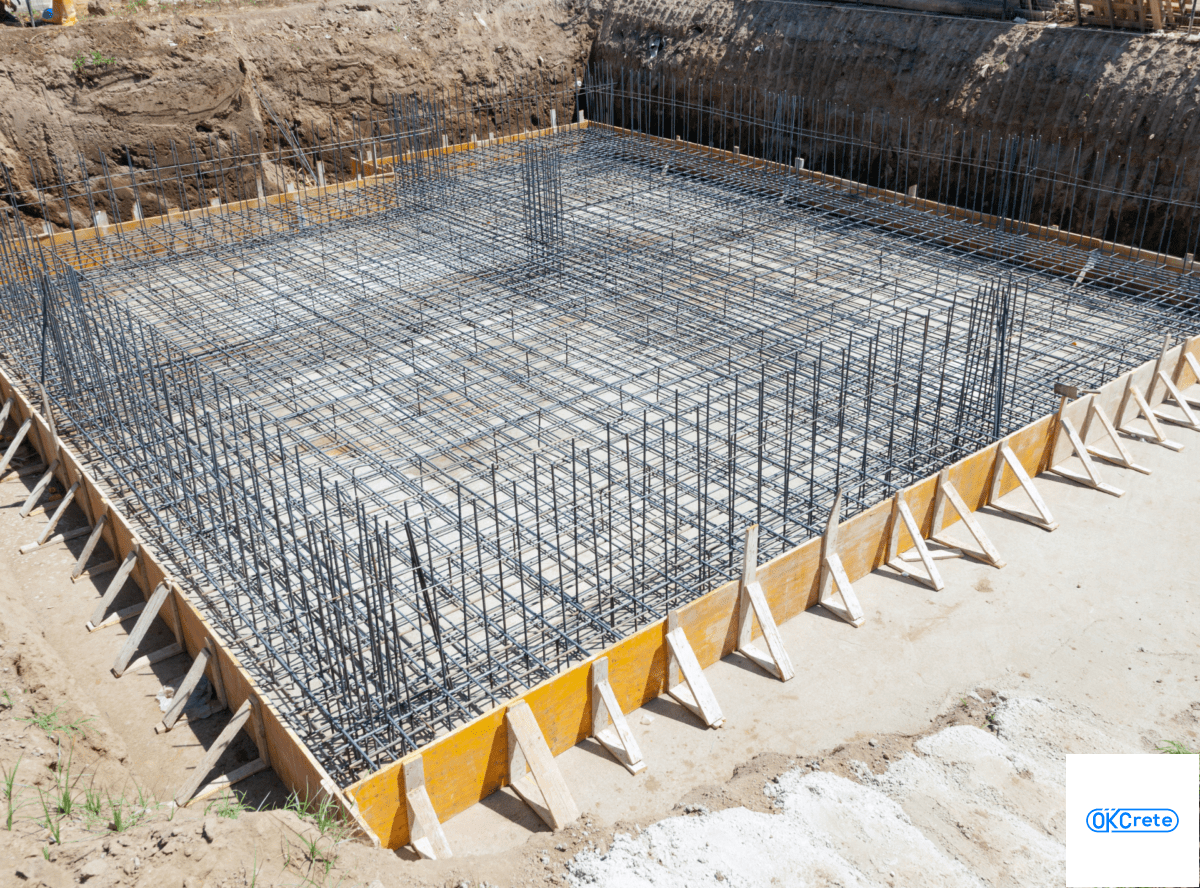
The construction of concrete slab foundations averages $5 to $14 per square foot, which translates to a total of $4,000 to $33,600 on average. Standard home foundations are usually 6″ thick and incorporate essential elements such as steel rebar reinforcements, vapor barrier, and foam insulation.
Concrete foundations are recognized as the most cost-effective option for home foundations. They’re known for their straightforward installation and minimal maintenance requirements. Nevertheless, they may experience shifting and cracking in unstable soil or extremely cold conditions.
Concrete Slab Cost Calculator

The cost of a concrete slab is contingent on the concrete’s quality and the project’s complexity. Labor accounts for 40% to 50% of the overall concrete project’s cost, with materials constituting the remaining 50% to 60%.

The follower factors may affect the total cost:
Concrete Grade – Concrete grade is evaluated on a scale ranging from M5 to M70. The numbers correlate with how many megapascals — a measurement of pressure — of strength the concrete slab has after it has cured for 28 days. M5 is associated with the lowest strength, and M70 is the highest.
While higher-grade concrete offers enhanced durability and stability, it also comes with a higher cost compared to lower grades. For most residential projects, the commonly used concrete grades fall within the range of M10 to M25. Strengths up to M70 aren’t usually necessary.
The mix proportions for M5 concrete are: 1 part cement, 4 parts sand, 8 parts coarse aggregate, and 0.4 parts water.
The ratio of M25 concrete is 1:1:2, which means that 1 kg of cement has to be mixed with 1 kg of sand and 2 kg of aggregate to achieve a compressive strength of 25 MPa.
- Leveling or Grading – The cost to level or regrade a yard is $0.40 to $2.00 per square foot – however, the price will increase depending on the accessibility of the work area.
- Pad Base – Gravel costs $1 to $3 per square foot or $10 to $50 per ton. To avoid shifting and cracking, certain extensive concrete projects necessitate a foundation of gravel.
- Reinforcement Material – For substantial slabs and foundations, extra support such as wire mesh, steel rebar, foam insulation, a vapor barrier, or thicker edges might be necessary
- Finishes – Decoration, curved edges, textures, diamond patterns, and colors cost extra.
- Stamped concrete costs $12 to $30 per square foot installed, including pouring the slab.
- Stained concrete floors cost $3 to $15 per square foot on average, not including the slab.
- Polished concrete floors cost $3 to $15 per square foot, not including the slab.
- Concrete sealing costs $2 to $5 per square foot.
Labor Costs

On average, labor costs for concrete slab installation range from $3 to $5 per square foot. This covers the creation of concrete forms that secure the materials during the curing process. Additional expenses may arise if special equipment is needed for grading or pouring in challenging and inaccessible areas, potentially increasing overall labor costs.
Thickness
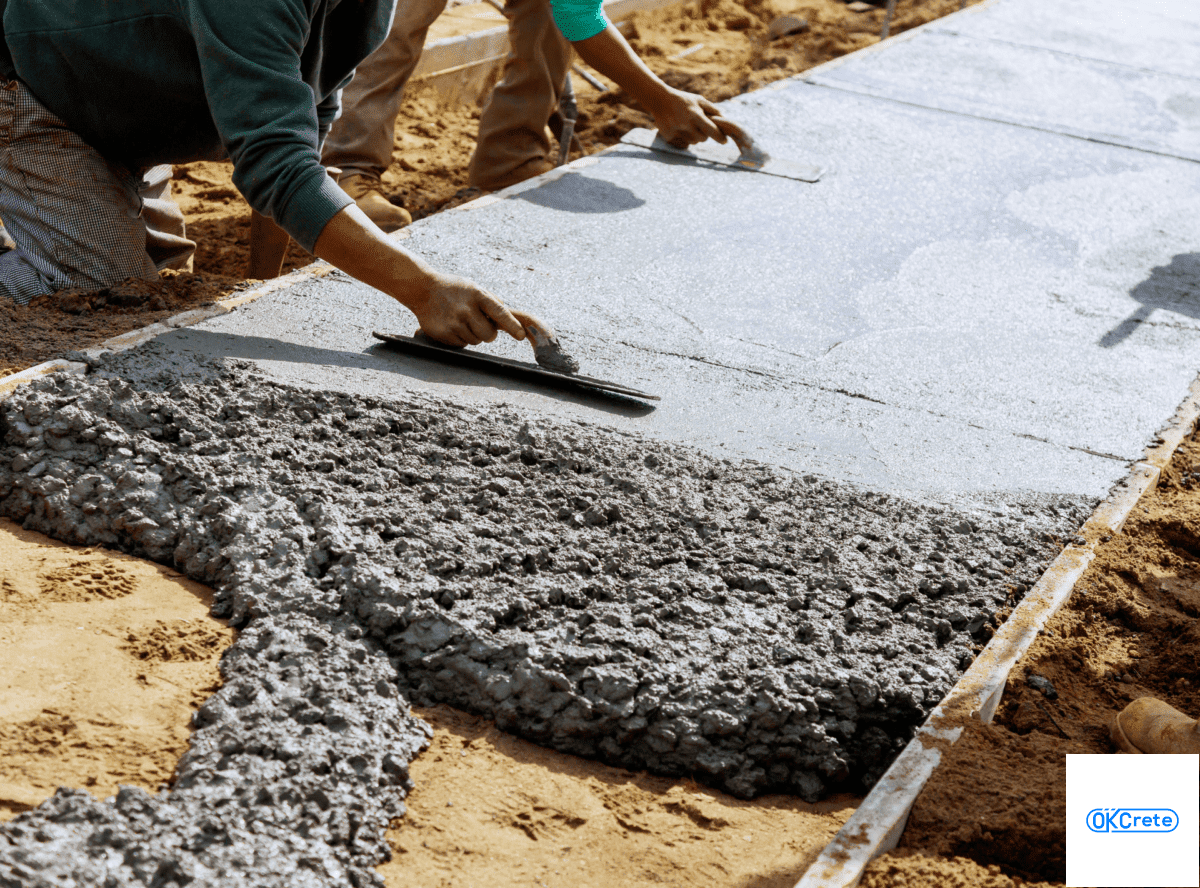
Concrete slabs with greater thickness offer increased stability but demand additional materials and labor. The standard thickness for most cement slabs falls between 4 to 6 inches. Many installers use cubic yard measurements for pricing, with one cubic yard typically covering an area of 81 feet for a 4-inch thick slab.

Cost to Repair vs. Replace Concrete
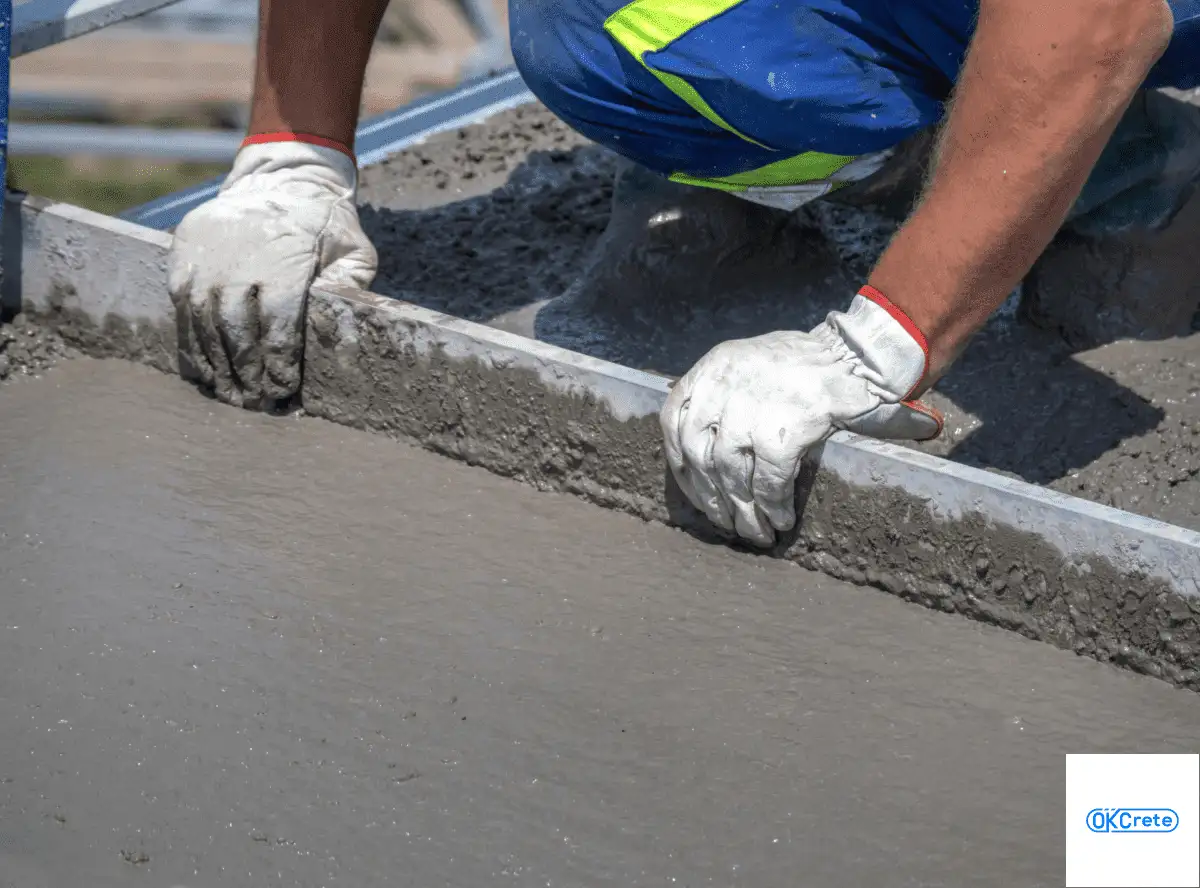
Concrete repair is a quicker and more economical alternative to completely replacing a slab. The expense for concrete resurfacing ranges from $3 to $7 per square foot, encompassing the removal of the top layer, fixing minor cracks and flaking, and the application of a thin overlay. If you’re opting for a stamped or decorative concrete overlay, the cost increases to $6 to $20 per square foot.
If your concrete exhibits significant cracks or structural issues, the optimal solution is to opt for replacement. The expense of concrete removal ranges from $6 to $12 per square foot, inclusive of disposal.
When You’re Looking for Estimates from Concrete Contractors

When you start to look around and do some research on concrete contractors near you, it’s important to remember to look for the contractors and companies that are experienced in pouring concrete slabs, and be sure to check out their Google and social media reviews.
It’s also smart to choose a licensed, bonded, insured company that has been in business for 5+ years. Be sure to reach out and get at least three quotes to compare and always avoid the lowest quote – which indicates low quality work. You know, you get what you pay for!
Some Questions to Ask:
- How long have you been working with concrete?
- Do you have a portfolio of similar projects you’ve done?
- What kind of site prep will this project require?
- How thick does the slab need to be?
- Will we need to reinforce the concrete?
- What does it cost to remove an existing slab?
- Can you seal, stain, or stamp the slab? If so, how much will this cost?
- How long does it take to fully dry?
- What kind of maintenance will the concrete need?
- Do you offer guarantees or a warranty? If so, what does it cover?
About OKCrete

OKCrete is here for all your concrete needs, even if it’s just answering some questions during your search for a concrete contractor!
Whatever your construction projects are, it’s important to ask these questions and do your research before hiring a concrete contractor. You want to ensure that they’re not only experienced in concrete installation and, well, everything concrete, but also utilizing the best building materials, using high performance concrete. They should also be able to provide you the answers to all of your questions pre-project.
As for OKCrete, we’re experienced, determined, skilled, and ready to help you with all of your concrete needs. Whether you’re looking to install a new concrete slab, driveway, foundation, pool deck, or anything else – we’ve got your back.
Concrete Slab FAQs
What is a concrete slab?
A concrete slab is a flat, horizontal surface made of concrete, typically used as a foundational element in construction. It serves as a stable base for structures like buildings, patios, or floors. Concrete slabs are commonly poured directly onto the ground, providing a durable and level foundation.
They can vary in thickness depending on the intended use and load-bearing requirements. Slabs are often reinforced with materials like steel to enhance their strength and prevent cracking.
When should I replace a concrete slab?
You should consider replacing a concrete slab under several circumstances. If the slab has extensive, irreparable cracks compromising its structural integrity, or if there are signs of a significant settling leading to uneven surfaces, replacements may be necessary.
Also, severe damage from frost heave, water erosion, or underlying soil issues could warrant replacement. If the concrete slab is exhibiting persistent problems despite repair attempts or if it no longer meets the load-bearing requirements for your intended use, replacement becomes a practical solution.
Regular inspections for visible damage, along with addressing issues promptly, can help determine when replacement is needed to ensure the longevity and stability of the structure.
In addition, if the concrete is 40 years or older or if you notice large cracks, significant crumbling, sinking edges, warping or holes, or pooling water or poor drainage – these are other signs that it’s time to replace your concrete slabs.
How long does a concrete slab last?
On average, concrete slabs have a lifespan of 30-50 years, but this can extend beyond 100 years with proper sealing and maintenance. In colder climates where the ground freezes regularly, concrete is prone to cracking.
Structures like driveways and patios, exposed to the elements, generally have shorter lifespans compared to foundations or garage floors. The longevity of concrete slabs is significantly influenced by environmental factors, maintenance practices, and the specific usage conditions they endure.
How long does a concrete slab take to dry?
Concrete slabs typically require 1 to 2 days to dry sufficiently for pedestrian or pet traffic without leaving footprints. It is advisable to wait 1 to 2 weeks before driving on the concrete service. After a curing period of 28-48 days, the concrete is considered fully cured, attaining its optimal strength and durability.
Can I pour a concrete slab myself?
Pouring a concrete slab yourself is possible, but it requires careful planning, preparation, and adherence to proper procedures. Here are the general steps to consider if you’re contemplating a DIY concrete slab:
- Site Prep: Ensure the site is well-prepared, level, and properly compacted. Clear any debris, rocks, or vegetation.
- Formwork: Create a formwork to define the shape and dimensions of your slab. Use wood or other suitable materials to construct the mold.
- Reinforcement: Depending on the size and purpose of the slab, consider adding reinforcement like rebar or wire mesh for added strength.
- Mixing Concrete: Follow the correct concrete mixture proportions. You can use ready-mix concrete or mix it yourself using cement, sand, gravel, and water.
- Leveling and Finishing: Use a screed to level the surface and finish it with a trowel for a smooth and even texture.
- Curing: Cover the concrete with plastic or wet curing blankets to prevent it from drying too quickly and ensure proper curing.
- Drying and Curing Time: Allow sufficient time for the concrete to dry and cure before subjecting it to heavy loads or traffic.
While pouring a small concrete slab is feasible for many DIY enthusiasts, larger or more complex projects might benefit from professional assistance. Always follow safety guidelines and local building codes, and consider consulting with a professional if you have any uncertainties about the process.
What is the difference between concrete and cement?
Concrete and cement are often used interchangeable, but they refer to distinct materials. Cement is a key ingredient in concrete, serving as the binding agent that holds the mixture together. It is a fine powder, typically made from limestone, clay, shells, and silica, which, when mixed with water, forms a paste that solidifies and hardens.
On the other hand, concrete is a composite material composed of cement, water, sand, and gravel or crushed stone. The combination of these elements results in a robust construction material with versatile applications in building foundations, roads, and structures. In essence, cement is one component of the concrete mix, playing a crucial role in its formulation and hardening process.
